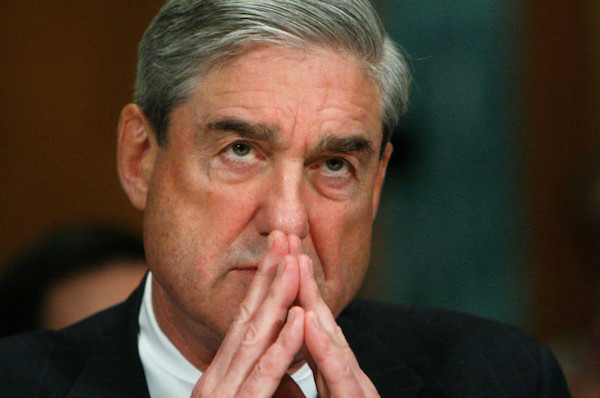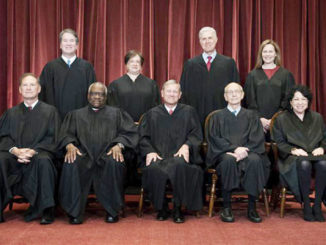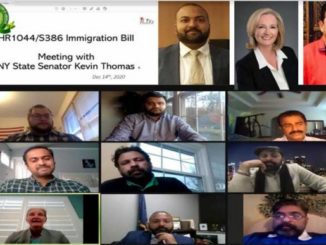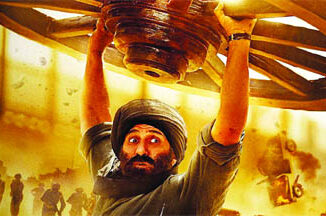

“Bob Mueller is doing exactly the right thing by simply focusing on this investigation and trying to determine the truth,” says Panetta. “I don’t know what the final result is going to be, but I have a sense that whatever that final report shows that people are going to thank Bob Mueller for the way he handled this.”
Special counsel Robert Swan Mueller III is the second-most famous man in Washington. Time Magazine just ranked him No. 3 on their Person of the Year list, after crusading journalists and President Trump. It is impossible to spend a day in this town without hearing or reading Mueller’s name. He will go down in history, for better or worse, as one of the pivotal figures of the Trump era.
All this for a man who seldom speaks and is rarely seen. He is omnipresent and absent, inescapable but elusive, the invisible yang to Trump’s gold-plated yin.
“Mueller’s silence has invited noisy speculation from partisans,” writes Time. “To critics on the right, he is an overzealous prosecutor drunk on power and roaming beyond his mandate in a bid to drum Trump out of office. To liberals, he is a crusading hero who won’t quit until he brings the President to justice. The public narrative of Mueller’s investigation this year has often described its central character more as myth than man.”
Such is the peculiar nature of Washington that a powerful man who shuns the spotlight should become an object of fascination, and the specific character of Mueller — an old-school WASP indifferent to entreaties for speeches, interviews and photo-ops. More people have seen Robert De Niro playing Mueller on “Saturday Night Live” than have seen the special counsel himself.
“I always joke that Bob Mueller has turned down more interview requests in his career than most people in Washington ever get in the first place,” says Garrett Graff, author of “The Threat Matrix: Inside Robert Mueller’s FBI and the War on Global Terror” and Mueller’s de facto biographer. “Contrary to every single thing that the president tweets today, Mueller is and always has been probably the most apolitical nonpartisan person in the city. He does everything that he can to avoid the public spotlight and anything even slightly resembling politicking.”
Mueller is content to be known and respected within a very small circle of close friends and colleagues. That’s rare in a town filled with former high school class presidents with enough egos to “float battleships,” as former senator Alan Simpson put it. Politicians love cameras — and Twitter feeds, Instagram and more — but Mueller’s only public statement as special counsel came on May 17, 2017, the day he was appointed: “I accept this responsibility and will discharge it to the best of my ability.”
More than anything, silence has come to define Mueller. He’s become a meme, a cartoon superhero or supervillain, more powerful with every word he does not say.
“Like all the FBI directors I have known, including myself, Bob is not about to try his case or run his evidence by the court of public opinion,” says William Webster, the only man to head both the FBI and the CIA. “That’s not how our FBI works. It’s not how Bob Mueller works. It might make for good tv ratings, but it leaves too much open for misunderstanding and, in my opinion, creates a circus atmosphere around critically important cases.”
Kenneth W. Starr, the independent counsel investigating President Bill Clinton, had a different approach: He spoke to reporters during his five years in that job in hopes it would help Americans better understand the reasons for the investigation.
“Relationships between prosecutors and the press are inherently difficult and sensitive,” he says. “A federal prosecutor wields important powers and thus should always be held accountable by the American people. That accountability carries with it, in my view, a role for providing public information . . . without transgressing important limitations — especially the protection of grand jury secrecy.”
Mueller, says Starr, may have been chastened by former FBI director James B. Comey’s “inappropriate public relations approach” and wants the charging documents to speak for themselves. “All things considered, I think he has followed a wise strategy, albeit at the expense of a more complete public understanding of his important work.”
Leon Panetta, former White House chief of staff and head of the CIA, says there’s another reason for Mueller’s silence: He doesn’t want to give President Trump any ammunition that could compromise the case. “He really feels that the integrity of the investigation has to be protected and not allow the president to undermine it.”
Mueller is not instinctively somebody who plays the political game, says Panetta, who has known the prosecutor for years. “He didn’t even particularly like to testify before Congress, but he knew that he had to do it. He really thought that those who were out there in the press were only undercutting their position rather than strengthening it.”
“More than anything, silence has come to define Mueller. He’s become a meme, a cartoon superhero or supervillain, more powerful with every word he does not say”.
In fact, Mueller — by temperament and professional experience — has always preferred to be judged by his deeds, not his words. He grew up in Princeton, a childhood of privilege and private boarding schools, where self-aggrandizement and promotion were considered poor form. His stints as a Marine platoon leader during the Vietnam War and as a federal prosecutor emphasized teamwork rather than any individual effort. During his 12-year tenure as head of the FBI, he rarely appeared at public events and turned down virtually all the A-list invitations that came with that title.
During his trip to the Capitol to brief Congress in June 2017 — one month after becoming special counsel — Mueller and his team navigated back hallways and stairwells to avoid the media. There have been only three widely circulated sightings in the wild since then: One photo of Mueller standing on a street corner in March, one in July with Mueller and Donald Trump Jr. both waiting to catch a flight at Gate 35X at Reagan National Airport and one of Mueller and his wife in September at the Genius Bar in Georgetown’s Apple store, where they were getting help with a laptop.
The dearth of images led to this plea by Slate staff writer Heather Schwedel earlier this year: “Why are we clamoring for new Mueller pics like paparazzi stalking Jennifer Aniston? Because every time his investigation into Russia’s interference in the 2016 presidential election makes news — which is a lot these days — sites like Slate must use the same photos of Mueller we’ve been using since this past summer . . . . Our nation’s poor photo editors are stuck with a cache of boring, already-used shots of one of the most newsworthy figures of our political moment.”
Who is Robert Mueller?
By now, it goes without saying that Mueller and his prosecutors run the tightest ship in Washington. No interviews, no leaks, no whispers, no jokes, no nuthin’. In August, members of his team were spotted by the press waiting for a Shake Shack delivery at an Alexandria hotel during Paul Manafort’s trial. Shake Shack, huh? joked a reporter. Peter Carr, Mueller’s spokesman, would not even confirm the order.
Mueller rarely ventures outside his temporary office in a nondescript federal building. Even in his most public role before this, as head of the FBI, Mueller only appeared in public when it was important to the bureau. Most photos of him are from testimony to the Senate several years ago. His last speaking appearance (announced before he was named special counsel) was in May 2017 at the graduation of his granddaughter from a small boarding school in Massachusetts.
“One of the things that I think is important in understanding him is understanding the perspective that he brings to this job,” says Graff. “If you got him in a moment of candor, he would say that this is no more than the third-hardest job that he has ever had after the Marines in Vietnam and after being FBI director in the wake of 9/11. In that sense, the photo of him at the Apple Store is indicative of a lot: He’s just continuing to lead his life. His life has always been under the radar and non-showy, and that’s exactly how he has comported himself as special counsel.”
Mueller’s private life is even more circumspect. It is possible, after following the bread crumbs of his biography, to determine his comings and goings. He lives in a gated community in Georgetown with his wife of 52 years, Ann. They have two daughters, Melissa and Cynthia, seen only when they attended his 2001 confirmation hearing as head of the FBI. The couple regularly attends services at an Episcopal church in downtown Washington. They both play golf, although Ann’s the better golfer of the two.
And they have a weekly dinner date, usually at their favorite Italian restaurant a few miles from their home. The Muellers have been regulars for years, typically sitting unnoticed behind the bar in the back of the room. How, in this age of smartphones and cameras, does Mueller pull that off? Slip in a side door? The owner, as did everyone contacted for this article, declined to comment.
In fact, virtually everyone within Mueller’s orbit refused to talk about him. “I’ll pass along your request, but she never returns calls about Mueller,” explained the assistant of a lawyer who worked for him many years ago.
“The people that he has surrounded himself with throughout his career are temperamentally very like him,” explains Graff. “And he has a good set of longtime friends in D.C. that he primarily socializes with. He’s someone who draws a pretty firm line between work and home in terms of socializing. Part of the answer is just that the people around him don’t share the things that they do with him. And he has developed a series of places that he likes to go where I think that privacy is respected — and they’re also not the trendiest restaurants on 14th Street where he would be recognized.”
Even the press has been unwilling to cross Mueller’s invisible line. Salt Lake Tribune reporter Thomas Burr tweeted that he saw Mueller in June: “Gotta love DC. Walk into restaurant, run into the special counsel.” But Burr declined to say which restaurant, despite a flurry of responses to the tweet.
Some of this is respect for Mueller. Some of this is the fear of unintentionally providing a piece of information that could compromise the Russia investigation. And some of this is just fear for Mueller himself. Given the heated rhetoric surrounding President Trump — and a gunman who shot up Comet Ping Pong over the Pizzagate conspiracy theory — friends and colleagues are reluctant to say anything that could harm him in any way.
“Bob Mueller is doing exactly the right thing by simply focusing on this investigation and trying to determine the truth,” says Panetta. “I don’t know what the final result is going to be, but I have a sense that whatever that final report shows that people are going to thank Bob Mueller for the way he handled this.”
We asked Mueller’s spokesman if he had a response to . . . well, anything.
“We appreciate your reaching out,” replied Carr. “But we’ll decline comment at this time.”
(Source: Washington Post)





Be the first to comment